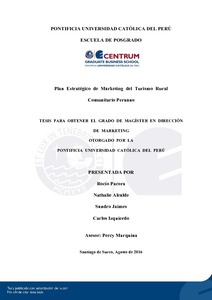| dc.contributor.advisor | Marquina Feldman, Percy Samoel | |
| dc.contributor.author | Pacora, Rocío | es_ES |
| dc.contributor.author | Alcalde, Nathalie | es_ES |
| dc.contributor.author | Jaimes, Sandro | es_ES |
| dc.contributor.author | Izquierdo, Carlos | es_ES |
| dc.date.accessioned | 2017-02-28T15:29:37Z | |
| dc.date.available | 2017-02-28T15:29:37Z | |
| dc.date.created | 2016 | |
| dc.date.issued | 2017-02-28 | |
| dc.identifier.uri | http://hdl.handle.net/20.500.12404/7984 | |
| dc.description.abstract | El Turismo Rural Comunitario (TRC) va evolucionando positivamente a nivel
mundial (OMT, 2015). Sin embargo, el Perú aún no da una respuesta firme a esta
demanda latente. El problema principal es que la concepción del producto está en
función a la oferta y no en función a la demanda. El plan propuesto sugiere que el Perú
deberá responder con una imagen renovada y una comunicación coherente en función
al público objetivo. Él mismo permitirá la diferenciación mediante el desarrollo de una
propuesta de valor enfocada a las expectativas y deseos del nuevo cliente: turista
extranjero de ingresos medio-alto; y el desarrollo de un oferta turística innovadora,
cohesionada y con identidad propia; que busque llamar la atención, generar una buena
relación de calidad - precio y la agilización de la conversión de una reserva en tiempo
real.
El presente plan estratégico de marketing pretende que el Perú sea reconocido
como el primer destino en TRC al 2022. Para ello, el objetivo principal del plan será
generar un incremento del 10% anual del flujo de turistas; y que este a su vez
contribuya al desarrollo sostenible de las comunidades campesinas e indígenas. El éxito
girará en función a la generación de un vínculo emocional con el cliente mediante tres
ejes: innovación, creatividad y entorno 2.0. Para ello, el plan contempla el desarrollo
de la mezcla de marketing y una inversión de US$ 2’400 mil que se dividirán en cuatro
campañas potentes en los principales mercados emisores. Con ello se pretende obtener
un aumento gradual del tráfico de turistas del 30% anual y un ROI social en función las
ventas, que dará como resultado el crecimiento de la empleabilidad y calidad de vida
del poblador rural | es_ES |
| dc.description.abstract | The Rural Ethnographic Tourism is evolving positively worldwide (OMT,
2015). However, Peru still does not give a firm answer to this latent demand. The main
problem is that the design of the product is based on supply and not according to
demand. The proposed plan suggests that Peru must respond with a new image and
consistent communication according to target audience. This will allow differentiation
by developing a value proposition focused on the expectations and wishes of new
customers: foreign tourists with medium-high income; and the development of an
innovative, and cohesive offer with its own identity that seeks attention, generates a
good relationship quality - price and expedites the conversion of a real-time reservation.
This strategic marketing plan aims that Peru is recognized as the leading
destination for TRC by 2022. To this extend, the main objective of the plan will
generate an increase of 10% annual flow of tourists; and that this in turn contributes to
the sustainable development of rural and indigenous communities. Success will rotate
according to the generation of an emotional bond with the customer through three
pillars: innovation, creativity and environment 2.0. For this, the plan includes the
development of the marketing mix and an investment of US $ 2.400 millions, which
will be divided into four powerful campaigns in key source markets. This seeks a
gradual increase in tourist traffic of 30% and a social ROI based on sales, which will
result in the growth of employability and quality of life of the rural population | es_ES |
| dc.language.iso | spa | es_ES |
| dc.publisher | Pontificia Universidad Católica del Perú | es_ES |
| dc.rights | info:eu-repo/semantics/openAccess | es_ES |
| dc.rights.uri | http://creativecommons.org/licenses/by-nc-nd/2.5/pe/ | * |
| dc.subject | Turismo -- Mercadeo | es_ES |
| dc.subject | Planificación estratégica | es_ES |
| dc.title | Plan estratégico de marketing del turismo rural comunitario peruano | es_ES |
| dc.type | info:eu-repo/semantics/masterThesis | es_ES |
| thesis.degree.name | Maestro en Dirección de Marketing | es_ES |
| thesis.degree.level | Maestría | es_ES |
| thesis.degree.grantor | Pontificia Universidad Católica del Perú. CENTRUM | es_ES |
| thesis.degree.discipline | Dirección de Marketing | es_ES |
| renati.discipline | 414147 | es_ES |
| renati.level | https://purl.org/pe-repo/renati/level#maestro | es_ES |
| renati.type | https://purl.org/pe-repo/renati/type#tesis | es_ES |
| dc.publisher.country | PE | es_ES |
| dc.subject.ocde | https://purl.org/pe-repo/ocde/ford#5.02.04 | es_ES |






